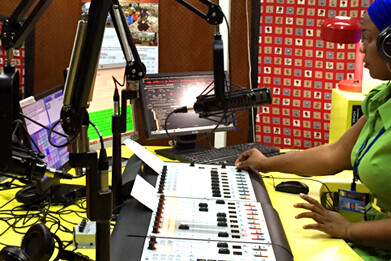Our weekly round-up of public service media news stories from around the world.
27 June – 3 July
Africa
From PMA: Jimi Mathews has quit as acting CEO of SABC as a result of the organisation’s “prevailing, corrosive atmosphere” and its impact on his moral judgement.
From Human Rights Watch: Two executives from a privately owned Algerian television channel that airs a satirical political talk show were placed in pretrial detention.
China to increase media cooperation with Africa
From AfricanBrains: China has vowed to remain “frank and sincere” as it seeks to increase media cooperation with Africa.
Distorting the news in Africa: How dictators have tried to shape the media landscape to their liking
From CIMA: In response to the influence of Western media in their countries, African dictators have ramped up nationalistic and pan-African propaganda through government-sponsored media.
Establishment of an African Audiovisual and Cinema Commission
From Abidjan via Mokolo Projects: Ministers of Culture, Youth and Sports of the AU member states have created this Thursday, the African Audiovisual and Cinema Commission (AACC) as a specialised agency of the African Union.
Kenya renews commitment to enhancing access to information and transparency
From Article 19: Kenya submits second National Action Plan to the Open Government Partnership (OGP).
Nation Media Group closes KFM radio
From The New Times: Popular Rwandan radio station will stop transmitting following decision by parent company, Nation Media Group (NMG) based in Kenya.
South African PSB won’t show negative stories about its president
From PMA: The South African Broadcasting Corporation (SABC) will now avoid covering negative news about its president in a plea for “respect”.
Zambia’s The Post Editor Arrested
Via All Africa: The Post newspaper owner, Fred M’membe, his wife and the Deputy Managing Editor face charges of breaking into a building despite a court order allowing them to resume.
Zambian journalists say the government is using the taxman to silence the press
From Quartz: Zambia’s largest independent newspaper, the Post, has been shut down over a dispute with the country’s tax authority. Critics say it’s a ploy to silence the newspaper ahead of the August 11 general election.
Asia
Abe’s control of media leaves election tainted
From the Japan Times: Japanese government accused of having stranglehold over media prior to elections
India embarks on digital TV consultation process
From ABU: A consultation paper on digital television transmission (DTT) and mobile TV has been issued by the Indian communications regulator, paving the way for private players to enter the sector.
Japan uses anime to target young voters
From BBC News: Japanese cities are using manga and anime to persuade young people to vote in forthcoming elections.
Media Groups in the Philippines seek better relationship between media and the president
From PMA: Media groups have written an editorial commenting on the relationship between the Philippines’ president Rodrigo Duterte and the state media, calling for better reporting, pay and protection for journalists.
Pakistan and China strike new broadcast deal
From PMA: Pakistan has granted permission for China’s state broadcaster CCTV and documentary channel CCTV-9 to be transmitted in the country.
Australia, New Zealand & the Pacific
Australians Vote 1 for ABC’s Federal Election Coverage
From ABC: The ABC provided the most watched and listened to election coverage across the nation.
NZ media ‘ignore’ Pacific’s biggest story in spite of social media revolution
From Asia Pacific Report: New Zealand news media are “ignoring” the biggest story in the Pacific region in spite of a social media revolution taking the storytelling to the world.
Vanuatu Daily Digest condemns ‘blanket state censorship’ of social media
From Asia Pacific Report: Vanuatu’s Public Service Commission is forbidding government workers from accessing social media, Radio Vanuatu News reports today.
Europe
Croatia must ensure public broadcaster’s independence
From IPI via PMA: Prominent press freedom organisations have listed public broadcasting independence, defamation laws and the safety of journalists as their chief concerns in a recent mission to Croatia
European subscription video-on-demand subscribers to reach 50 million by 2020
From the EBU: New research from the EBU’s Media Intelligence Service shows that subscription video-on-demand (SVoD) subscribers in Europe grew 56% in just one year between 2014 and 2015, and are expected to reach 50 million homes by 2020.
From the European Journalism Observatory: How has the European media dealt with Brexit? The need for a European public sphere, where the continent’s affairs are discussed for themselves and not viewed through a national prism, is again thrown into focus.
Lord Puttnam: BBC board should be independent of government
From the Guardian: Oscar-winning producer also calls for digital levy on ISPs, and said the licence fee should be abolished as soon as possible
Lord Puttnam backing for BBC ‘Scottish Six’ news programme
From the BBC: A report into the future of public service broadcasting in the UK has given backing to the idea of a BBC “Scottish Six” TV news programme.
Southeastern Europe: not very digital
From Osservatorio balcani e caucaso: According to the data recently released by the European Commission, the EU member states in Southeastern Europe are among the least digital in the continent
Latin America & the Caribbean
Agreement leads to first Public TV Network in Latin America
From PMA: National broadcasters from Chile, Uruguay, Peru, Mexico, Paraguay, Costa Rica and Colombia have signed a new transnational agreement for joint work and an exchange of programming across the continent.
Investigative journalism in the Caribbean: accessing information
From WAN-IFRA: Two-part article exploring some of the challenges faced by investigative data-driven journalists in the Caribbean.
Public communication will always be a source of tension, says entity president
From EBC: PMA’s CEO Sally-Ann Wilson has been interviewed about the value of public media amidst Brazil’s ongoing public media crisis
Registration for the CBU AGA extended to July 13, 2016
From the Caribbean Broadcasting Union: The CBU has extended the deadline for registration to attend its annual conference in Cuba
Trinidad’s WIN TV and radio stations face uncertain future after founder’s death
From Daily News New York: Broadcaster taken off the air by Trinidad’s telecommunications regulatory agency
UN experts express concern as Brazilian government interferes with public TV
From PMA: Two UN experts on freedom of expression have commented on the recent Brazilian government agenda regarding public media.
Middle East
RSF’s Turkey representative freed thanks to strong support
From RSF: Reporters Without Borders (RSF) pays tribute to the massive support that has resulted in today’s conditional release of its Turkey representative, Erol Önderoglu, after ten days in an Istanbul prison.
North America
CBC Docs seeking next generation of #Indigenous creators to tell their stories
From CBC
Journalists and Academics Collaborating? It’s Paying Off for Investigative Reports in Canada
From MediaShift
Public Radio’s Existential Crisis
From The Wall Street Journal: Is NPR struggling to adapt to the digital age?
Seven ways public media can attract a more diverse workforce
From Current: Report about the need to address the obvious lack of diversity in some US public media organisations.
Other
A Future for Public Service Television: Content and Platforms in a Digital World
New report: Based on the Puttnam Inquiry into the future of public service television in the UK, this report outlines its suggestions for an improved and sustainable PSM landscape.
From NPR: Find tips and advice on storytelling and journalism from the NPR Editorial Training team, created especially for public media journalists.
Journalists under fire and under pressure: summer magazine 2016
From Index on Censorship: Index on Censorship has dedicated its milestone 250th issue to exploring the increasing threats to reporters worldwide.
UNHRC: Significant resolution reaffirming human rights online adopted
From Article 19: Attempts to weaken the resolution, led by Russia and China, were resoundingly rejected. More than 70 states supported the resolution.
If you have any suggestions for our weekly round-ups, please email PMA at editor@publicmediaalliance.org.
These stories are provided for interest and relevance to public service media issues, they do not necessarily reflect the views of the Public Media Alliance.
All headlines are sourced from their original story.

